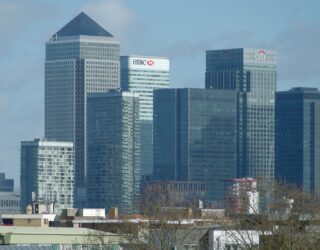War in Iraq, British austerity, American student debt, flooding in Bangladesh, economic turmoil in Greece, surging displacement of entire nations, inequality rising everywhere; current affairs may sometimes feel like isolated disasters in an inexplicably depressing world. But taking a closer look at what causes or exacerbates each disaster and patterns begin to emerge. Many of the world’s problems are tied up with our current economic system and a slavish obsession with GDP growth as the prime measure of success. The notion that the widespread suffering and damage these cause is avoidable through alternative ways of managing the economy is starting to gain traction.
Europe and America’s presence in Iraq long predates the 2003 invasion
George Bush’s ‘Strategy for Victory in Iraq’ trumpeted economic growth as their marker of progress. By 2012 up to 500,000 Iraqis had died due to the war since 2003, and many more were brutally punished for failing to comply with new measures taken to raise GDP. But as economic productivity increased by 13% the country was hammered into shape by Washington thanks to certain reforms: specifically privatization and the lowering of barriers to free trade, allowing rapid foreign investment in the war-stricken country.
America’s interests in Iraq, though seasoned with attitudes of colonial necessity are largely financial in nature. Euro-America’s presence there long predates the 2003 invasion and foreign powers are forever clenching and unclenching their grip over the country, because what happens in Iraq invariably doesn’t stay in Iraq. Its resources and geographic location have a historic link to the global economy. A monopoly over trade and exports in Iraq allows greater control over the world’s economic system. Experts understand foreign intrusions have exacerbated violence in the region and that and the West’s latest wealth-grabbing interventions have influenced the rise of ISIS. In other words, rising GDP and unregulated trade have come at the cost of mass suffering.
85% of the money recouped in cuts to benefits goes directly to Britain’s elites in the form of tax breaks and subsidies
But reforms imposed in Iraq are only a cog in a much larger machine. European and American rulers enforce their economic logic at home as well as abroad. In the UK this manifests as endless austerity and in the US as (among other things) mounting student debt. Through privatization, deregulation, and welfare cuts, the current British government’s free market fundamentalism ensures that only the most wealthy and powerful benefit. These cuts hit the most vulnerable the hardest, with 85% of the money saved in cuts to benefits going directly to Britain’s elites in the form of tax breaks and subsidies, which ends up costing the overall economy in the long run.
Since the 1940s when economists employed the measure to monitor available wealth for the war effort, Britain’s GDP rocketed for decades before income inequality increased by 30% since the 1960s. The incomes of the richest 0.1% of the population have increased over 150 times more each year than the incomes of the poorest 90% in that time.
Nearly 90% of the Greek bailout money went to the financial sector rather than the functioning of the Greek state
As British services face the unending threat of privatization as well as spending cuts, American education too is no longer a public good but a commodity. Student indebtedness, the largest form of consumer debt in the U.S., has spiraled by nearly $700bn since 2003. But if universities are subservient to market logic, if students are taught to become efficient members of the labor force and the economic cogs keep turning, if GDP rises, then all is well. At least, all is well for the richest, whose privileged position is preserved as class divides widen.
Greece is one of the greatest Western victims of this economic delusion, forced by the IMF, ECB and EU, against democratic will, to cut their own economy to shreds in return for a series of financial bailouts. Greece accepted the same structural adjustments as enforced in Iraq and elsewhere: unhindered trade, privatization and a liberalized banking system. Through these measures the troika ensured that nearly 90% of the bailouts went to the financial sector rather than the functioning of the Greek state, again privileging the economic order over public good.
Mass displacement and migration caused by environmental disasters and wars amounts to an increase of over a million people migrating every year since 1980
A threat even greater than poverty or war, climate change, also hinges on our economic system. Naomi Klein explained in ‘This Changes Everything’ how climate change is intrinsically connected to the engine of capitalism, international free trade, and nonrenewable energy consumption. Among the starkest victims is Bangladesh, where flash floods, storm surges, salinity and extreme temperatures menace the population with increasing insecurity. The resulting mass displacement and migration from environmental disaster worldwide, coupled with those fleeing war in the Middle East, amounts to an increase of over a million people migrating every year since 1980.
That global problems are connected is not a new idea. It’s how they are connected that is in dispute. Groups such as the IMF, the World Bank and the WTO trace these issues to low economic growth, localized corruption and a lack of international cooperation. But their globalized methodology to grow the economy is in fact causing (or at least inflaming) the issues at hand. Consider how fracking, oil extraction, and international exports contribute to economic growth, whereas energy sourced from your own solar panels and growing your own vegetables do not raise GDP. Economic growth is a skewed and destructive measure of progress.
An organization called The Rules is mapping it all out
Grassroots organizations across the world are standing up against the violence of our current economic order and seeking alternatives, some of which are beginning to mature into solid political forces. The energy whipped up by Occupy has caused an internal uprising in the Democrat Party; the Indignados in Spain fed the anti-corruption fervor that caused Podemos to spring seemingly out of nowhere; the Zapatistas of Mexico have fought against NAFTA and kept the Mexican state out of entire regions for several years; India’s Ekta Parishads have forced the state to grapple with their demands for structural land reform; and an organization called The Rules is mapping it all out.
The strategist of The Rules, Martin Kirk explained how there is an abundance of options other than the current system: “There are more alternatives to this way of living than can possibly be counted. We’re tricked into thinking that there must be AN alternative system, when in truth the magic comes when there are many systems. We can learn from nature here – that nature that capitalism is rapidly destroying. Nature creates diversity. It is the foundation of everything, from evolution over aeons to resilience in each and every life. We have forgotten this, in our single-minded drive for technological and material ‘progress’.” There are many routes that we could take other than capitalism. The issue, as Naomi Klein has articulated, is whether we will be able to redirect ourselves before it is too late.
Image: byung chul klm



